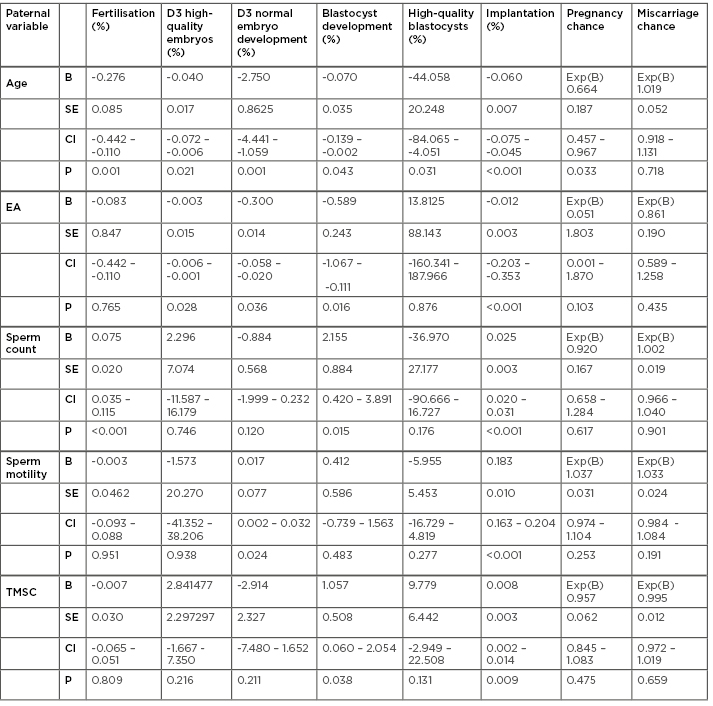INTRODUCTION
Infertility is experienced by an estimated 48.5 million couples worldwide.1 Even though male factor infertility is known to play a role in 50% of the cases, the impact of male partner characteristics on in vitro fertilisation (IVF) is often ignored.2 Indeed, male factor infertility is equally important for establishing the success of assisted reproduction cycles. However, few studies have focussed on the influence of male factors on IVF outcomes, with those that have producing conflicting results,3-6 probably due to confound variables introduced in the analysis regarding autologous cycles. Considering this, the use of an egg-sharing donation programme may be extremely useful for studying the impact of partner characteristics and semen parameters on intracytoplasmic sperm injection (ICSI) outcomes. The objective of this study was to investigate if paternal age, ejaculatory abstinence length (EA), and semen quality influence ICSI outcomes in recipients’ cycles in an egg-sharing donation programme.
MATERIAL AND METHODS
This study was performed in a private university-affiliated IVF centre. Data analysed in this historical cohort study were obtained via chart review of 268 vitrified oocyte donor ICSI cycles, as well as 321 oocyte recipients undergoing 427 oocyte recipient ICSI cycles, participating in an egg-sharing donation programme between January 2015 and May 2017. For this sample size, computed achieved post-hoc power was 95.7%. Oocyte donors were between the ages of 19 and 35 years old, and recipients were between the ages of 26 and 59 years old. General mixed models fit by restricted maximum likelihood, generated using covariates as fixed effects and egg-donors and egg-recipients as random effects, with unstructured covariance structure, were used to investigate the impact of paternal age, EA, and semen quality on recipients’ ICSI outcomes. The results are expressed as regression coefficient (B), standard error (SE), exponentiation of B (ExpB), 95% confidence interval (CI), and p-value (P).
RESULTS
Fertilisation rate was negatively affected by paternal age and positively affected by sperm count. High-quality embryo rate on Day 3 was negatively correlated with paternal age and EA. Normal embryo development (cleavage speed) rate on Day 3 was negatively affected by paternal age and EA, and positively affected by the percentage of progressive sperm motility. Blastocyst development rate was negatively influenced by paternal age and EA, and positively influenced by sperm count and total motile sperm count. Paternal age was negatively correlated with high-quality blastocysts rate. Implantation rate was negatively affected by paternal age and EA, and positively affected by sperm count, progressive sperm motility, and total motile sperm count. Paternal age was associated with reduced odds of pregnancy. These results are expressed in Table 1.

Table 1: General mixed model results for the associations between paternal factors and intracytoplasmic sperm injection outcomes.
B: unstandardised regression coefficient; CI: confidence interval; D3: Day 3; EA: ejaculatory abstinence; Exp(B): exponentiation of B; P: p value; SE: standard error; TMSC: total motile sperm count.
CONCLUSION
Increasing paternal age and EA, as well as poor semen parameters, negatively impact ICSI outcomes, from fertilisation rate to pregnancy, in recipients’ cycles. Further tracking of the impact of paternal characteristics on ICSI outcomes should be encouraged. Despite the fact paternal age is uncontrollable, and there are only so many things that can be done concerning semen quality, shortening of EA length could be used as a strategy to optimise ICSI outcomes.








